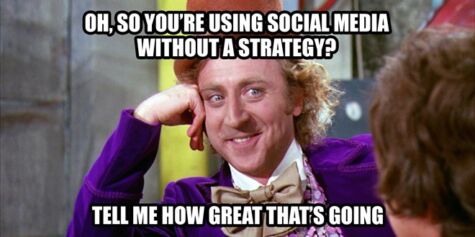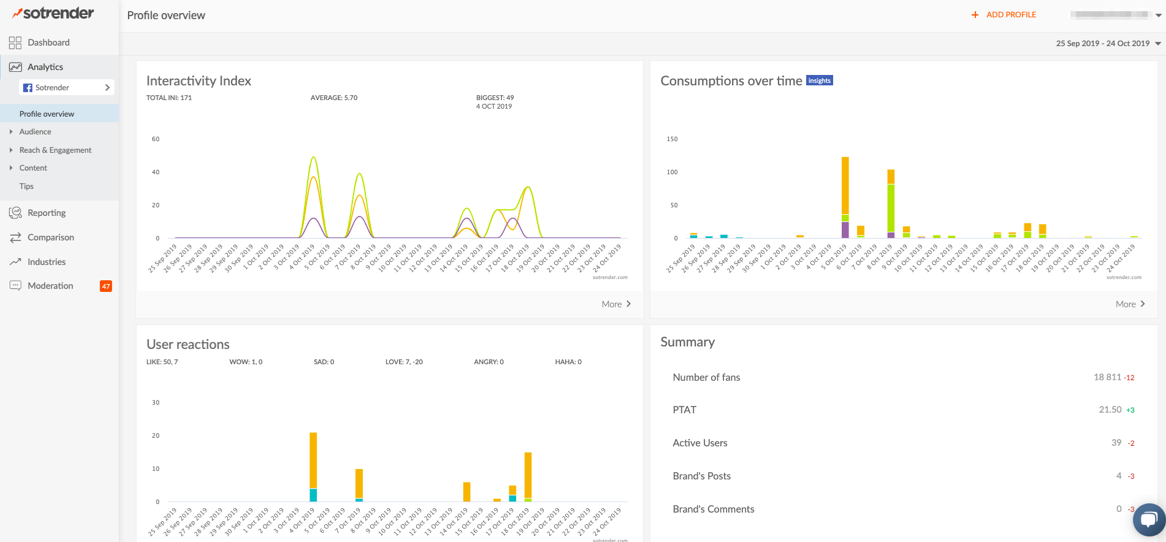Social media manager is a profession that continues to be in high demand in the job market. We tend to think that anyone could do a social media manager’s job because we spend a lot of time on social networks and are familiar with each platform’s functionalities. However, ask an experienced recruiter and you will learn that it’s not easy to find a social media manager that has it all.
So what skills do you need to become a social media manager and how you can acquire them? What steps do you need to take to enter the social media business? Read our recommendations.
In the US, there are currently 221.6 million Facebook users, which is almost 70% of the whole US population. Since the majority of the population is there, your potential customers are also likely on Facebook. This is true regardless of what your company is selling. It’s not surprising that 90 million small businesses use Facebook to promote their products and services in the US alone.
This data shows why social media managers are in such high demand, and why their job is challenging. They must compete against other companies on social media and come up with new strategies to engage their audiences. Social media managers are the voice of a company on social platforms and they have a substantial influence on how people will perceive the brand.
We’ve probably managed to persuade you that social media management is not just posting memes, but rather a serious business role. Now let’s take a closer look at what exactly social media managers do.
What do social media managers do?
Social media managers play many roles. We list their most important tasks below.
#1 Creating a social media strategy
Each post is a part of a larger, well-thought-out strategy, rather than a one-time shot. In-house social media managers develop strategies based on their company’s needs. Meanwhile, freelancers create a strategy after studying the marketing goals and expectations of their clients.
At this stage, social media managers use their knowledge of the characteristics of each social media channel to decide which channel will be the best fit to achieve their goals. They must also be familiar with social media metrics to be able to deliver and measure the KPIs requested by the client or their boss.

#2 Creating content
As you all know, a social media post consists of copy and a visual. A social media manager is responsible for preparing both elements of the post. They do it either on their own, like most freelancers, or in cooperation with copywriters and graphic designers.
Either way, social media managers must know what visual formats are available on each platform. This, of course, includes image and video dimensions for each available placement. They must also know what type of copy (style, tone of voice, number of characters) will bring results on a given channel.
#3 Managing ads
Social media marketers know that if they want to create hype around their product on social media, they can’t just rely on organic reach. Therefore, social media managers must also be skilled advertisers.
This involves not only being able to launch an ad on Facebook, Instagram, LinkedIn, Twitter, or YouTube. It also means optimizing the campaigns and monitoring the results daily. Every social media manager knows what CPC, CPM, CPV, or CPA mean, and based on these and other metrics, they can make data-driven decisions about their ads.
#4 Monitoring and understand analytics
When we scroll through social media, we only see the final results of the social media manager’s job – the attractive posts. However, people often don’t realize how much analytical work and research lies behind the published content.
Social media managers look at data from multiple social media channels every day to determine which content brings the best results. Therefore, they often use social media analytics tools like Sotrender to get a birds-eye view of data from multiple sources. They can then compare it with the results of the competition and make better business decisions.

This is how Sotrender looks from inside
#5 Managing an online community
71% of consumers that had a positive experience with a brand on social media are likely to recommend the brand to others. Social media became a customer service platform that supersedes telephone helplines and emails. As a result, social media managers also become customer service specialists. As the representatives of the brand, they must communicate (in line with the company’s voice and guidelines), and try to respond to the messages as soon as possible. If they manage multiple social media channels at once, they often use social inbox tools that allow them to keep all communication with users in one tab and stay organized.

#6 Keeping up with the latest trends and company news
Social media is a fast-changing business. Social networks constantly implement innovations and test new functions. To stay up-to-date with these changes, social media managers follow industry news, read blogs, and monitor conversations on Facebook groups for specialists.
At the same time, as the representatives of the brand they manage, they must stay up-to-date with what is going on in the company. They should keep track of new initiatives, upcoming product launches, or business collaborations, to be able to use them as topics for their social media posts.
What skills social media managers need to have?
Hopefully, the previous paragraph hasn’t scared you off. Let’s break down each of the social media manager’s tasks into the skills needed to perform them.
Typically, they are knowledgeable about:
- Functionalities and characteristics of all major social media platforms (business versions and advertising platforms)
- Platform-specific copywriting
- Graphic design (Canva, GIMP or more advanced tools by Adobe)
- Analytics and research (native social media analytics and external tools)
- Customer service
- Project management
- Teamwork
- New trends, business news
How can you get the skills and become a social media manager?
We cannot recommend a single path that will lead you to a social media career, because each and every social media manager we know (including ourselves) has gotten there in a different way, learning new skills on the go. However, we can certainly give you some recommendations that we wish we had received at the beginning of our journey.
1. You don’t need a university degree in social media
When today’s social media managers were enrolling at universities, degrees in social media weren’t even available yet. Today, social media became a crucial outlet that has already started surpassing radio and television.
You can find bachelor and master’s programmes in social media at many universities across Europe and the US. However, the curricula are as impressive as their tuition fees. Many experts question whether the programmes can keep up with the evolving industry. They argue that social media are constantly evolving and trends will have changed by the time you complete a degree.
You definitely need at least a BA/BSc degree to get a job in a social media department. However, the degree doesn’t have to be strictly related to social media. You can easily learn the basics of social media management in one-day and two-day seminars and conferences.
You can also look for some online social media certifications and courses that will advance your career. Remember, working in the social media industry requires constant expansion of skills.
That includes:
- Attending conferences
- Reading blogs and articles written by experts
- Case studies from other companies
- Listening to social media podcasts
These activities must become part of your daily routine if you want to advance your career.
2. Build profiles on top social media channels to learn and showcase your skills
When you choose a hairstylist, you will probably judge him by his own haircut. Would you entrust someone whose results don’t reflect the expertise they claim to have? Exactly. 😉
The same applies to your social media accounts being a showcase for your social media skills. Your potential new client or employer will definitely research you online. Decide which social media accounts you want to make public and turn them into real gems.
If you are a freelancer, it’s a good idea to establish yourself as a social media expert. You can start writing a blog, create a Page or a group on Facebook, launch a business profile on Instagram, or maybe even a channel on YouTube. Discover how the business side of social media works on your own. Get acquainted with Business Manager, Ads Manager, and Facebook Insights.
What’s more, this approach requires preparing a strategy for your own social media presence. You will have to learn how to plan ahead and follow a content calendar. You will have to create content on your own, monitor what your audiences are responding to, and learn how to communicate with them online. To reach your potential clients, you will have to start experimenting with ads and learn how to optimize campaigns on small budgets. In short, you will be able to learn the social media manager’s work on your own.
3. Start from an internship in a social media agency
An internship is a great opportunity to learn when you don’t feel ready to start your own professional social media channels. During an internship, you will learn under the guidance of more experienced colleagues and you will experience the fast-paced work-life of a social media agency. What’s more, you will shake off some myths and stereotypes about social media manager’s work. By the end of it, you can decide if this is the right career path for you.
The good news is that some agencies offer work contracts after the internship period. It’s a good idea to enquire about the chances for employment after the internship already during your first interview. The perspective of employment will keep you more motivated at work and will show your employer that you are determined to do your best and stay with the company.
4. Work on your graphic design skills
Many social media managers cooperate with graphic designers, especially on more challenging projects. However, to be competitive on the market you must know how to prepare aesthetic visuals for your post without external help.
There are so many tools and resources to create images for social media out there, that we probably don’t have enough of your attention left to list them all here. At Sotrender we use Canva for our social media graphics and this tool proved to be sufficient for our needs.
5. Understand the metrics
Just like we mentioned before, a social media manager’s job requires analytical skills. You need to understand all platform-specific metrics to be able to measure whether your channels are reaching and engaging the desired audience. There is no better way to learn how these metrics work than gauging your own social media performance.
We recommend that you set up your personal business accounts or anonymous test accounts on all major platforms to learn where you can find these metrics and what they represent. All platforms offer a clear explanation of their metrics – whether it’s Facebook Insights, Twitter Analytics, Instagram Insights, or LinkedIn Analytics. The metrics, as well as analytical dashboards of each of the platforms, are very intuitive and user-friendly.
When you will advance your career and win your first clients, you will have to manage a few accounts on multiple platforms simultaneously. Daily monitoring of analytics on multiple native analytics dashboards will become more time-consuming than before. When you will reach this point, we recommend using an external social media analytics tool and keeping all your analytical data in one place. Such tools also allow you to compare your performance against your competition and generate automatic reports that you can present to your client or a superior.
6. Follow the brands you admire
In order to be able to publish a few social media posts on each social media account every week, you will have to be very creative. It’s not easy to come up with a good copy and an idea for a visual a few times per day. You will need to look for inspiration.
Follow brands that you think have a quality social media presence. Spend time on social media looking for great posts and ads that can spark new ideas. Then go to the pages where the posts come from, and scroll through the entire page to see other posts. Maybe you can find something that you could use in your projects, like an interesting use of frames or a bold background. Don’t plagiarize, but look for some visual solutions, language tricks in the copy, etc.
A good idea is to keep track of what the best social media agencies in your country and worldwide are doing. They usually share their new campaigns on their social media channels or publish case studies on their websites. Follow their projects and learn from the best of your trade.
7. Build an online portfolio as you go
A social media manager’s job is very intensive and fast-paced. In fact, it’s often difficult to have a lunch break without answering comments and messages from users on your social media accounts or answering urgent emails. Nevertheless, remember to find time to document your work.
Even the best social media post is, in fact, a very ephemeral product that will last maybe for a week at best, and for much less time on the users’ news feeds. However, when you will be looking for a new job or a new client, you must be able to show them a few examples of your best posts together with their metrics, to prove that you are an expert in your field. You can build your portfolio online for free with tools like Behance or Dribble, so it isn’t very time-consuming. Trust us, you will thank yourself for it in the future.

Time to get to work
If you want to become a social media manager, you don’t have to follow a strict recipe. As you can see, there are different ways that you can get there. What matters is that you have the right skills and that you’re willing to constantly work on improving your knowledge.
We hope that our suggestions can be useful to you and that you will manage to jump-start your career in no time.
Did we miss anything? Do you have any suggestions or questions for us? Let us know! 😉








